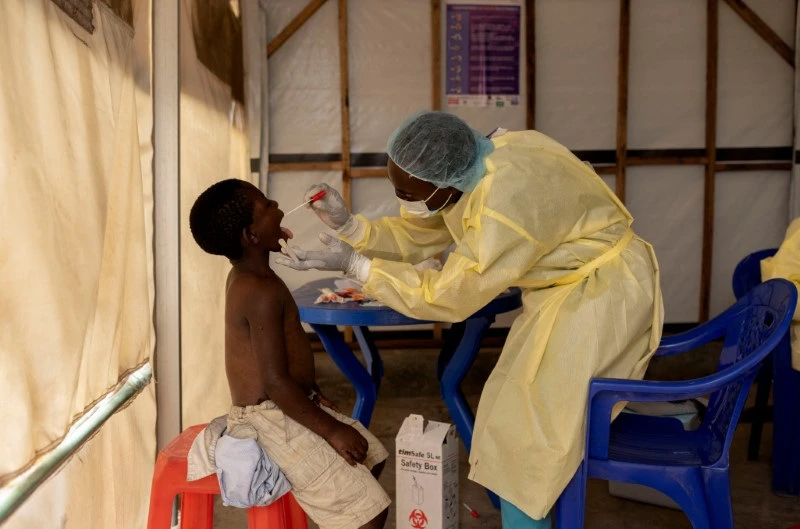WHO declares global public health emergency over mpox outbreak in Africa
 Christian Musema, a laboratory nurse, takes a sample from a child declared a suspected case Mpox - an infectious disease caused by the monkeypox virus that spark-off a painful rash, enlarged lymph nodes and fever; at the the treatment centre in Munigi, following Mpox cases in Nyiragongo territory near Goma, North Kivu province, Democratic Republic of the Congo July 19, 2024. (Reuters Photo)
Christian Musema, a laboratory nurse, takes a sample from a child declared a suspected case Mpox - an infectious disease caused by the monkeypox virus that spark-off a painful rash, enlarged lymph nodes and fever; at the the treatment centre in Munigi, following Mpox cases in Nyiragongo territory near Goma, North Kivu province, Democratic Republic of the Congo July 19, 2024. (Reuters Photo)
The World Health Organization (WHO) has declared the ongoing surge of mpox cases in Africa a global public health emergency, marking its highest level of alarm in response to the worsening situation. The announcement was made Wednesday following a meeting of experts who advised WHO Director-General Tedros Adhanom Ghebreyesus to take this significant step.
“Today, the emergency committee met and advised me that in its view, the situation constitutes a public health emergency of international concern. I have accepted that advice,” Tedros stated during a press conference. He emphasized the seriousness of the situation, urging global coordination to prevent further transmission, treat those affected, and save lives.
Mpox, previously known as monkeypox, has notably spread through the Democratic Republic of Congo (DRC), where the virus was first identified in humans in 1970. The outbreak has now extended to neighboring countries, raising significant concerns.
Tedros highlighted the alarming rise in cases, with over 14,000 infections and 524 deaths reported in the DRC so far this year, surpassing the total figures from the previous year. The rapid spread of the clade 1b strain, particularly through sexual networks in the DRC, has been a key factor in the decision to declare the emergency. In the past month, around 90 cases of this strain have been reported in four neighboring countries—Burundi, Kenya, Rwanda, and Uganda—which had not previously reported mpox.
The declaration of a Public Health Emergency of International Concern (PHEIC) activates emergency responses under the legally binding International Health Regulations, compelling countries worldwide to take action. This is the second consecutive PHEIC related to mpox, following the outbreak caused by the clade 2b subclade that primarily affected gay and bisexual men and resulted in 140 deaths out of approximately 90,000 cases globally between May 2022 and May 2023.
The current clade 1b subclade, which has been spreading in the DRC since September 2023, is known for causing more severe disease with a higher fatality rate than the earlier clade 2b.
Mpox is a viral infectious disease transmitted to humans by infected animals, but it can also spread through close physical contact between humans. Symptoms include fever, muscular aches, and large boil-like skin lesions. WHO immunization experts recommend two vaccines for preventing mpox.
Marion Koopmans, director of the Pandemic and Disaster Management Centre at Erasmus University Rotterdam, noted that the PHEIC declaration “raises the level of alert, globally, and may allow WHO to access funds for emergency response.” However, she emphasized the challenges ahead, particularly in the DRC and neighboring countries, which are lacking resources for adequate diagnostic capacity, public health response, treatment support, and vaccination.
The International Federation of the Red Cross and Red Crescent Societies (IFRC) expressed “profound concern” over the virus’s spread and announced plans to scale up preparedness measures across Africa, especially in the severely affected eastern DRC. The IFRC highlighted its readiness to play a crucial role in containing the disease, even in the hardest-to-reach areas where the need for intervention is greatest.



